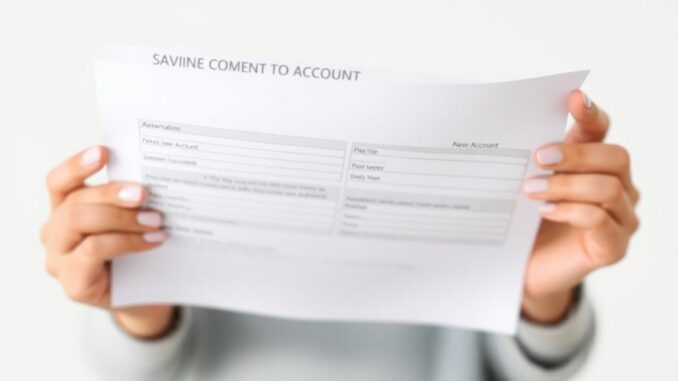
Opening a Savings Account: Your Essential Document Checklist
Opening a savings account is a straightforward process, often completable from the comfort of your home in under 15 minutes. To ensure a smooth experience, it’s crucial to have the necessary documentation and information readily available. This guide outlines everything you’ll need to get started on your savings journey.
Key Takeaways
- Proper identification, including a government-issued ID and Social Security Number or Taxpayer Identification Number, is required.
- Personal details such as your date of birth, proof of address, and contact information must be provided.
- Most financial institutions allow online account opening, typically taking 15 minutes or less with prepared documentation and an initial deposit method.
Essential Documents and Information
Before you begin comparing savings accounts, gather the following items for your application:
- Government-Issued ID: A valid driver’s license or passport serves as primary identification.
- Social Security Number (SSN) or Taxpayer Identification Number (TIN): Most banks require an SSN. If you don’t have one, an ITIN may be accepted.
- Date of Birth: Applicants are typically required to be 18 years or older to open an account independently. Minors can open joint accounts with a parent or guardian.
- Proof of Address: This can be a utility bill, credit card statement, or another official document displaying your name and current address.
- Contact Information: Ensure you have your full name, residential address, phone number, and email address handy.
- Initial Deposit Information: Many banks require an initial deposit. Have your checking account and routing numbers ready. Online applications may also allow funding via peer-to-peer payment services like Zelle or PayPal.
Factors to Consider When Choosing a Savings Account
Selecting the right savings account involves considering several key factors to maximize your financial growth:
- Deposit Insurance: Look for institutions insured by the Federal Deposit Insurance Corporation (FDIC) for banks or the National Credit Union Administration (NCUA) for credit unions. This typically insures up to $250,000 per account.
- Interest Rate: Compare Annual Percentage Yields (APYs). While traditional banks may offer low rates, online banks often provide significantly higher APYs, sometimes exceeding 4 percent, often with minimal fees. Some accounts feature tiered rates, offering higher returns for larger balances.
- Account Features: Consider features that align with your saving habits. Some banks allow the creation of sub-savings accounts, which can be helpful for organizing funds for different goals, such as a vacation or tuition.
Expert Advice for Maximizing Your Savings
Developing consistent saving habits is key to achieving your financial goals:
- Automate Savings: Set up direct deposits from your paycheck or automatic transfers from your checking account to your savings account to ensure regularity.
- Save Early and Consistently: Aim to save at least 10-15 percent of your income, especially when starting. Compound interest will significantly boost your savings over time.
- Leverage Unexpected Income: Utilize windfalls like tax refunds, gifts, or savings from coupons to supplement your savings rather than spending them immediately.
- Reassess Goals Regularly: As your life circumstances change, adjust your savings goals and strategies accordingly to ensure you maintain adequate financial cushions.
Frequently Asked Questions
- Can I open just a savings account? Yes, you can typically open a savings account independently. However, having a checking account, even at a different institution, can simplify the funding process.
- What types of savings accounts are available? The most common are traditional savings accounts, often with lower interest rates, and high-yield savings accounts, typically offered by online banks with more competitive rates.
- Is there a minimum deposit requirement? While some banks require a minimum deposit (often $25-$100), many do not. Be aware that some accounts may have balance requirements to avoid fees or earn the best interest rates.
- Will opening a savings account affect my credit score? No, opening a savings account does not impact your credit score as it does not involve borrowing money.

